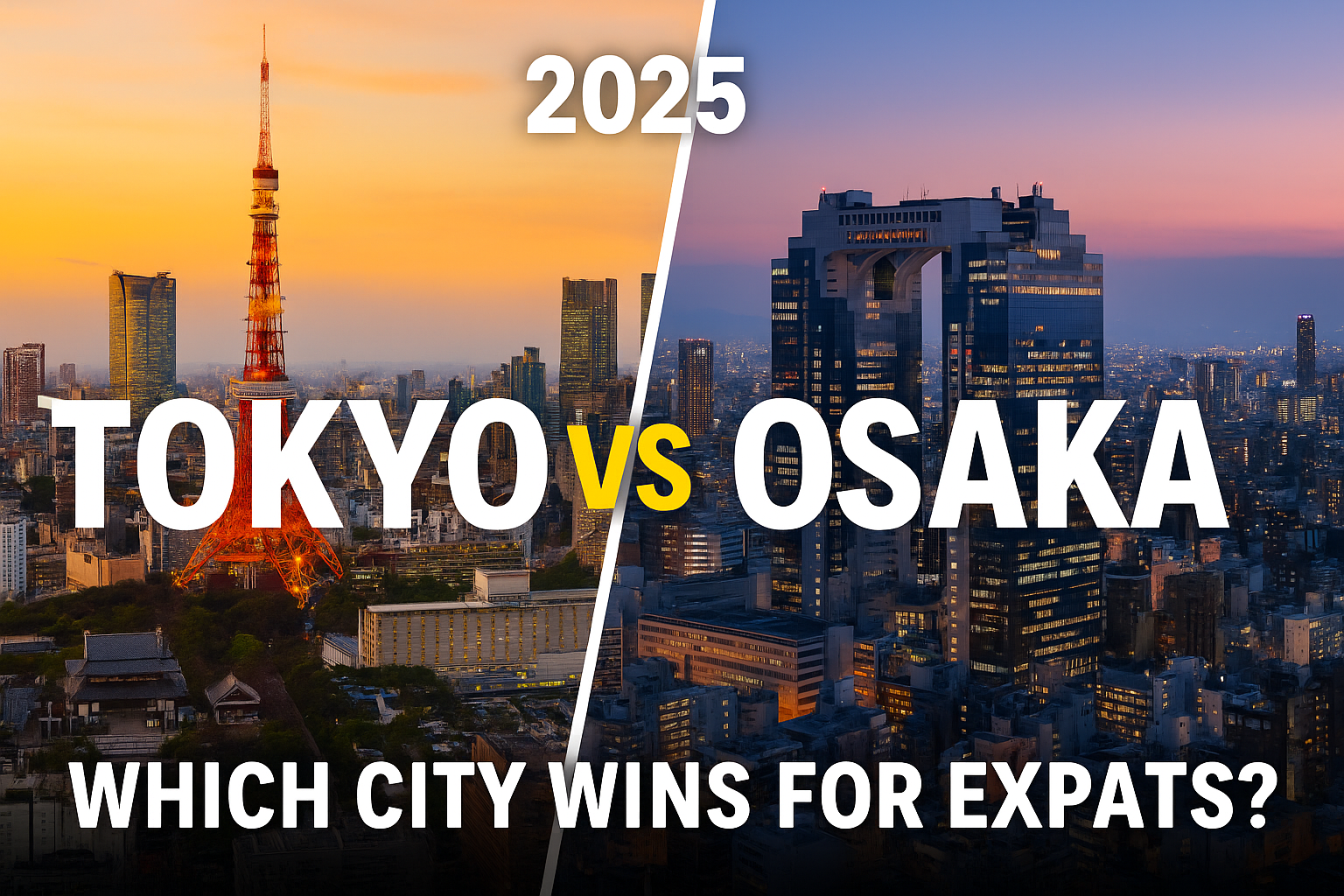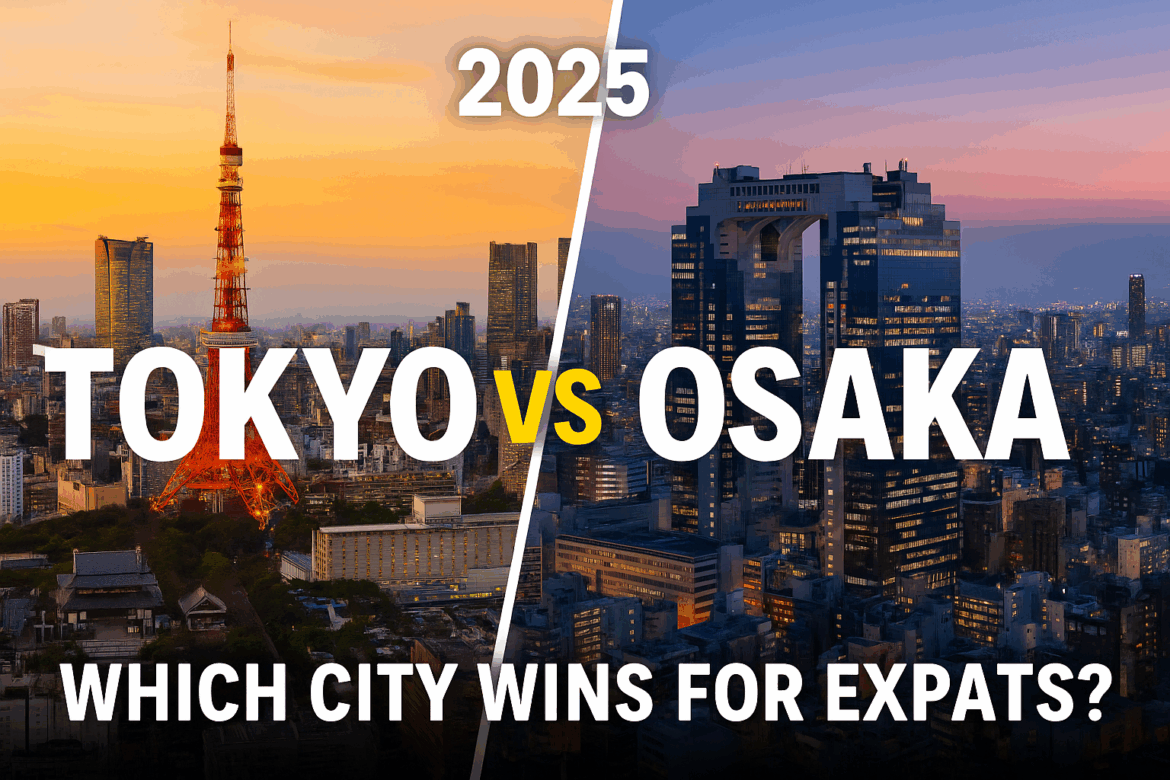Having lived in both Tokyo and Osaka for several years, I’ve often been asked: which city is better for living and working in Japan, especially for foreigners? The truth is, both cities offer remarkable quality of life, but their rhythms, values, and work cultures differ in subtle, important ways.


Tokyo vs Osaka 2025 — Which City Wins for Expats? • swikblog.com
Cost of Living and Daily Life
In 2025, Tokyo remains Japan’s most expensive city. Average rent for a one-bedroom apartment near the Yamanote Line is around ¥160,000–¥200,000, while in Osaka (Umeda or Namba areas) it’s roughly ¥110,000–¥140,000. Groceries and utilities are 10–15% cheaper in Osaka, which makes day-to-day living slightly easier for expats on moderate salaries.
Tokyo, however, compensates with greater access to international supermarkets, English-speaking medical facilities, and global schools—key advantages for families and foreign professionals. Osaka, in contrast, feels more local and community-driven: small bars where everyone greets you by name, mom-and-pop restaurants with no English menus, and a more relaxed pace that makes life feel personal.
Anchor insight: Japan’s Statistics Bureau data shows Osaka’s consumer prices still trail Tokyo’s by nearly 8% in 2025, confirming this everyday cost gap.
Work Culture and Job Market
Tokyo is Japan’s corporate heartbeat—home to headquarters of tech, finance, and media companies. The work culture remains formal and punctual. Expect longer hours, more structured hierarchies, and heavier reliance on Japanese communication norms. Yet, international firms like Google Japan, Rakuten, and Accenture have steadily introduced flexible hybrid models post-2023, softening the traditional rigidity.
Osaka, on the other hand, nurtures a “business with warmth” spirit. SMEs and creative industries thrive here: gaming studios, design agencies, manufacturing startups. You’ll find managers who encourage casual meetings over coffee and a friendlier tone even in negotiations. Work-life balance tends to be slightly better—commute times are shorter, and after-work socializing feels genuine rather than obligatory.
According to JETRO’s 2025 regional survey, Osaka ranked second only to Tokyo in foreign company presence but first in employee satisfaction among non-Japanese workers. That says a lot about how work feels versus how it pays.
Lifestyle, Commute, and Social Atmosphere
Tokyo’s public transport is flawless but exhausting: trains arrive every two minutes and yet are still packed. You’ll spend an average of 55–65 minutes commuting each way. Osaka’s transit network is smaller but far less crowded, cutting commute time to around 35–40 minutes on average. You can finish work and still make it to a live jazz bar or Dōtonbori dinner by 7 PM.
Culturally, Tokyo is polished—exhibitions, Michelin-star restaurants, international meetups. Osaka is expressive—street comedians, food festivals, and friendly banter even with strangers. Tokyo gives you ambition; Osaka gives you belonging.
🏙️ Also read:
Sydney vs Melbourne 2025 – Lifestyle and Work Comparison
Which City Fits You in 2025?
If you’re a career-driven professional aiming for corporate visibility or tech innovation, Tokyo offers unmatched scale, networking, and global exposure. But be prepared for higher stress, longer hours, and higher living costs.
If you value affordable comfort, friendliness, and creative opportunities, Osaka feels more livable and human. You may earn a bit less, but your personal time and social connections often make up the difference.
In truth, many expats start in Tokyo to build a career foundation, then move to Osaka for lifestyle balance. That’s exactly what I did—and I’d do it again.
Key Takeaway (2025 Snapshot)
Tokyo = Prestige, Pay, Pressure
Osaka = Comfort, Connection, Creativity
Both cities define Japan’s future in different tones. The right one for you depends not on what you earn, but on how you want to live.
Sources: Japan Statistics Bureau 2025 data, JETRO Regional Survey 2025, Numbeo Japan Cost Index, personal interviews with foreign residents (Tokyo & Osaka expat communities).


AloJapan.com